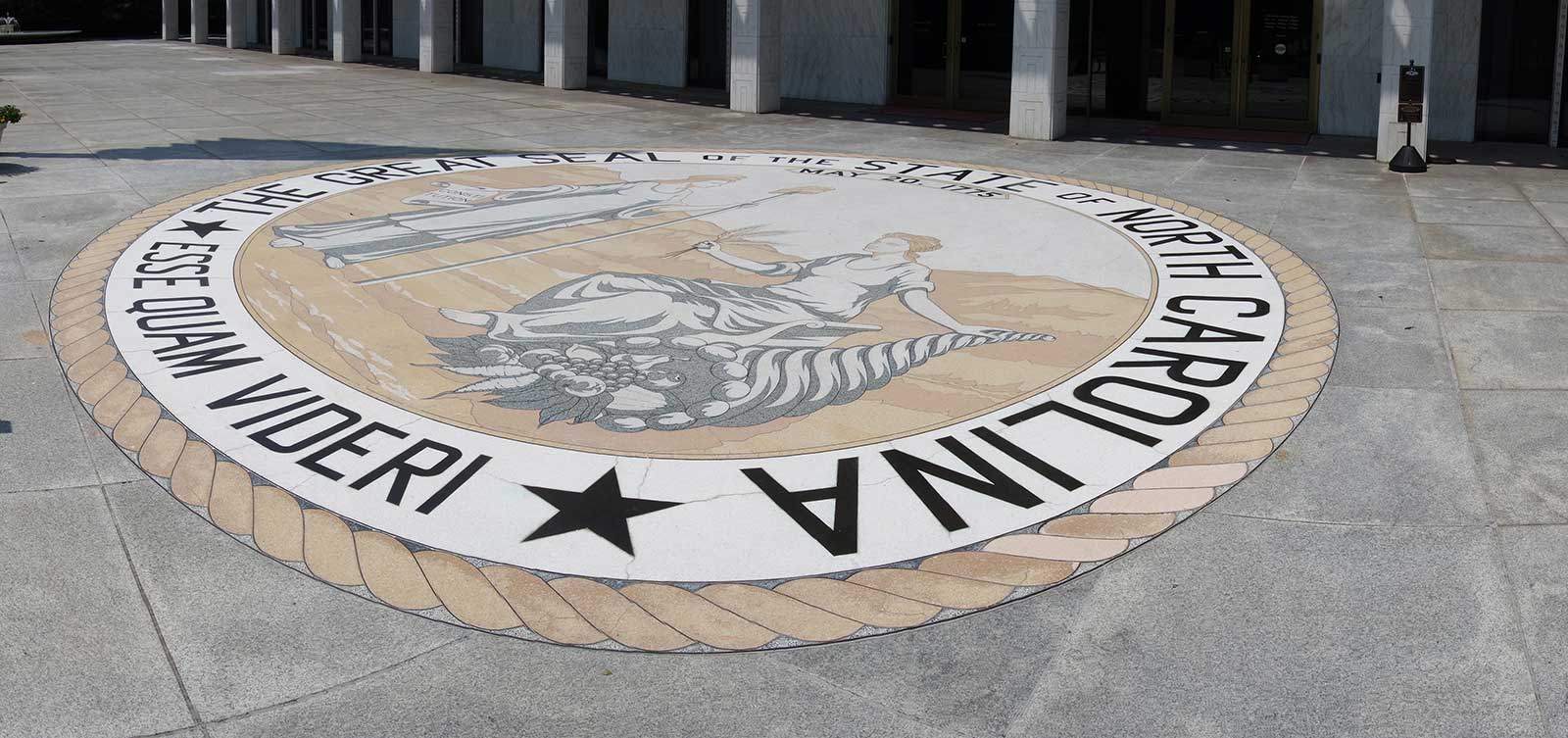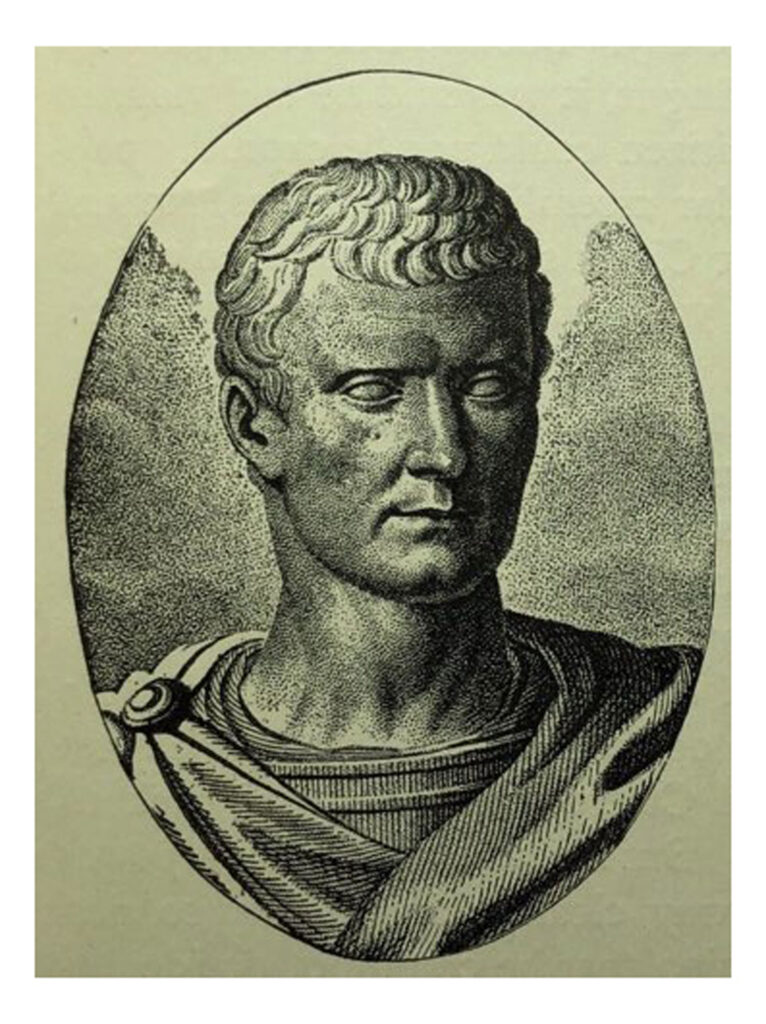To Be, Rather Than to Seem

On February 21, 1893, the General Assembly of North Carolina ratified legislation establishing the Latin phrase Esse Quam Videri as the motto of North Carolina. The Latin phrase means “to be, rather than to seem” and is taken from a philosophical treatise on friendship by the Roman thinker and writer Marcus Tullius Cicero (d. 43 B.C.).[i]
Part of Cicero’s argument regarding friendship, which Cicero insisted required virtue in people who would be friends, is that there are many fewer people actually possessed of virtue than those who wish to appear to be virtuous. At the time of the adoption of the state motto, North Carolina was the only one of the original thirteen states that did not have a motto. This is acknowledged in the text of the legislation, which is short enough to repeat in full.

WHEREAS. Contrary to the usage of nearly all the states of the American Union the coat-of-arms and the great seal of this state bear no motto; and whereas, a suitable motto, expressive of some noble sentiment and indicative of some leading trait of our people, will be instructive as well as ornamental, and the state should also keep in perpetual remembrance the immortal declaration of independence made at Charlotte,[ii] now therefore,
The General Assembly of North Carolina do enact:
SECTION 1. That the words “esse quam videri” are hereby adopted as the motto of this state, and as such shall be engraved on the great seal of North Carolina and likewise at the foot of the coat-of-arms of the state as part thereof.
SEC. 2. That on the coat-of-arms, in addition to the motto at the bottom, there shall be inscribed at the top the words “May the 20th, 1775.”
SEC. 3. That this act shall be in force from and after its ratification.
Ratified the 21st day of February, A.D. 1893.
The phrase “to be rather than to seem” seems to imply that the deliberate attempt to appear to be what one is not is an act of deception for which there is no justification, and therefore not to be done. Moreover, and importantly, the motto was chosen in part because it was “indicative of some leading trait of our people,…” Of course, it is easier, we may imagine, to appear to be competent in some ability than to develop competence in the ability, and surely to be competent is satisfying in a way that pretending never can be. However, the claim by the legislators about being rather than seeming as a leading trait of the people of North Carolina in 1893 suggests that the discipline and honesty required to be a people about whom this could be said possessed a cultural tradition able to produce such people.
Last month in “Front and Center” we discussed the importance of tradition and said of it in part:
For any kind of tradition, we may ask a few questions. Does it do well what it exists to do? Does it contain within it means for its improvement by the people living according to it? Importantly, does it sustain conditions in which human beings may flourish as human beings? We have spoken here several times of the fact that however complex human nature is, we know for certain that we are moral and intellectual beings because we have wills and we have intellects. So, in order to grow and flourish as human beings, it is important that a people develop families, educational institutions, military organizations, religious institutions and more that help people acquire the skills of thinking for themselves, improving their store of knowledge, and learning consistently to take correct decisions in whatever circumstances they are called upon to act.
This understanding of tradition is reflected in the first principle of Marine Corps leadership: know yourself, and seek self-improvement. In order to know oneself, a person must be capable of honest self-reflection (which is not a universally possessed human trait) and assessment of personal and professional strengths and weaknesses. As a consequence of what is an ongoing practice of self-reflection, one works to improve his knowledge and physical skills. Interestingly, people who conduct themselves this way naturally display another principle of Marine Corps leadership which is to set the example.
There are many ways to be, rather than to seem, and all of them demand honesty with oneself and with others. We may say, therefore, that honesty is among the fundamental traits of someone who seeks to be and not to seem. Among the recognized traits of a Marine Corps leader is integrity, which is defined as “…following your values and morals, being honest and fulfilling your promises.” The attempt to present a façade rather than a genuine face is an expression of poor judgment, but one who seeks to be genuine shows good judgment simply in the effort to be genuine. A Marine leader demonstrates judgment as “the ability to make sensible decisions consistently after calmly examining important details. For example, a leader with sound judgment might predict obstacles before they happen and create strategies to counter those challenges by collaborating with experts.” The Marine Corps properly asserts that a sense of justice “allows leaders to create a culture that’s fair and equal. For example, when assigning tasks, a just leader likely will focus on choosing Marines based in their qualifications [what they are professionally] to ensure that they’re being fair.” A broader and older definition of justice is for someone perpetually to give to others what is due to them. Among the moral obligations western tradition has recognized as belonging to each of us as human beings is to communicate honestly with others. Presenting a façade to other people is dishonest, and so we may conclude that it is unjust.
Clearly we could continue giving examples of someone who is genuine, but there might be benefit in taking a moment to consider what the General Assembly of North Carolina meant by adopting the state’s motto. The focus is the motto itself and not something more mundane like adopting a motto because everyone else has one. An important goal of a serious educational effort is to keep the average as high as possible because the quality of a population in terms of social order and economic efficiency depends largely, though not exclusively, on the quality of education. Here we encounter the question of what we mean by “education.” Is any form of information communication rightly called “education” so that someone reading cooking instructions on a bag of frozen vegetables is being educated? Is education a formal preparation for employment in an industrial or a technological economy? More to the point, does education, properly understood, include study and reflection on what a well-developed human being looks like? Years ago, people in the American public education establishment decided that education should be “value-free” because Americans purportedly disagreed on right and wrong to an extent that didn’t allow for coherent compromise. However true that conclusion may have been, the change had the effect of establishing, at least formally, that our institutions of public education were not concerned with the moral development of children. This is relevant to our consideration of the adoption of North Carolina’s motto because the legislators said in the law adopting the motto that they wanted to identify the state with a leading trait of the people of North Carolina. The trait the legislators identified, to be rather than to seem, describes a people who are genuine, honest, disciplined, and thus people who live such as to grow as human beings.
This observation takes us back to the idea of tradition since a tradition serves in part as a pattern of customs and practices that are ordered around a commonly shared understanding of right and wrong, good and bad, blameworthy and praiseworthy, and of such virtues as honor, courage, and commitment. People living in such a tradition, as did North Carolinians in the late 19th century, are genuinely human, and not merely seeming to be. This, we may say, is what it means to be, rather than to seem.
[i] Cicero’s treatise may be found here: https://oll.libertyfund.org/titles/cicero-on-friendship-de-amicitia
[ii] In May of 1775, representatives of the people of Mecklenburg County, North Carolina, declared their independence from Britain in protest over the English attacks on Lexington and Concord in Massachusetts a month before. The Mecklenburg Declaration held that no government that attacks its own citizens has a right to rule.


